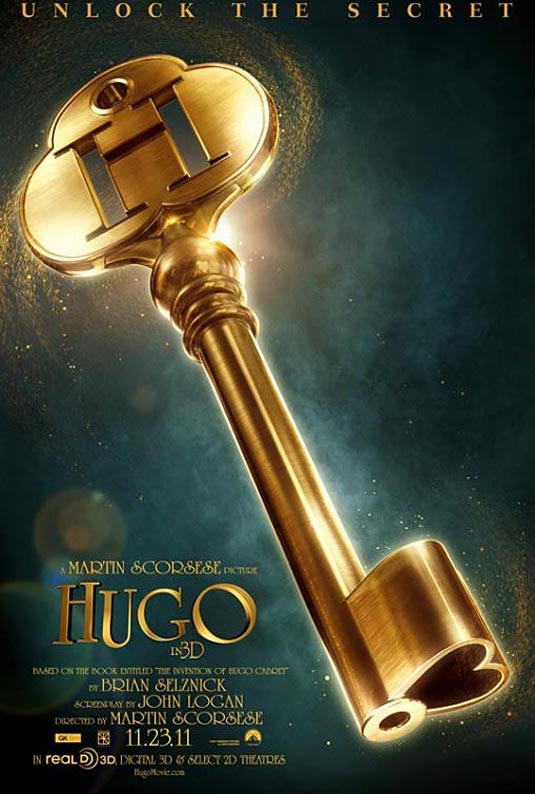At the age of 69 Martin Scorsese will direct films after Hugo. Some of them, if not most of them, will be great and some of them may even still be on the lips of many long after both America’s greatest living filmmaker has passed on and the sound of Hugo has gone silent. But it’s safe to say that, no matter how many films are still to come from Scorsese, and no matter their quality, none of them will be as beautiful, touching or personal as Hugo. Martin Scorsese has, one film at a time, become the very definition of American film. But he’s no longer that young kid from New York trying to push boundaries and change the landscape of film as we know it. He’s already been there and done that. Now he’s that wise old man, none of the ambition or vision having faded, who looks back at it all and sees just what it has meant. There will not, I think it’s fairly safe to say, be a more magical film released in 2011 than Hugo.
Disguised in the veil of grand family adventure, Hugo is a film that tells the tale of a young boy in Paris. His father (Jude Law) was a clockmaker who loved to tinker and fix things. Together they fixed old gizmos, so primitive by today’s standards that it’s a marvel they even worked at all, went to the movies, and loved each other very much. The father’s swan song was to be fixing up an old mechanical man called an Automaton. These were essentially life-like wind up toys designed to, when wound, perform human tasks. When Hugo’s father finds an old one forgotten in a museum he brings it home to fix. This one is a writer, but before it can again put pen to page an accident happens and Hugo is left an orphan.
He’s taken in by his alcoholic uncle Claude (Ray Winstone) whose job it is to see that all the clocks at the local train station are in working order. Once the boy is taught how to operate the clocks he is left alone to perform the man’s duties and continue fixing the Automaton while constantly evading the pursuits of the Chaplinesque Station Inspector (Sacha Baron Cohen) who hates orphans.
In order to fix the Automaton, Hugo begins stealing parts from George (Ben Kingsly) an old man who owns a meagre toy shop in the station. When George catches Hugo in the act he takes the boy’s notebook, the contents of which, mysteriously upset him. Hugo enlists the help of George’s adopted god daughter Isabelle (Chloe Grace Mortez) who is an avid reader, has never seen a movie and is looking desperately for a real life adventure.
Scorsese and his writer John Logan, like master storytellers, allow this story to unfold gradually, not revealing all of its secrets up front. This allows the revelation of George’s true identity and the children’s quest to find the missing pieces of the Automaton, and how it’s existence is connected to him, to take the film out of grand family entertainment and slowly reveal a loving ode to the magic of cinema and all of it’s history.
I dare not say another word for fear of revealing anything. Some reviews have pegged Hugo as being a film about the importance of film preservation and restoration. Knowing Scorsese and all his recent invaluable efforts towards these practices it’s a fair assessment, but misses the point. This is not a film about why we should restore old films, but one about the magic that is inherent in them and how that magic shapes and changes our lives from the untold joys they unlock in the imagination of children, to the sweet and tender reflections of times gone past they aspire in adults. Films are, at their very greatest, both dream and memory all wrapped into one. This must have certainly wrung true for Scorsese, one of, if not the most well versed filmmakers working today.
But the key to Hugo is not that it’s a self congratulatory pat on the back to those who are well versed enough to know the film history that it pays such loving tribute to. It is rather, like Woody Allen’s Midnight in Paris, a tip of the hat to the works of art that defined the medium as we know it, while still creating something new and modern with the love that these reflections of the past have created. Hugo is thus, above all, the perfect anachronism.
So then the question remains, in an age where family films have become lightning paced flashes of colour and sound, will children be able to accept Hugo? Yes, I think, for some they will. Smart, mature ones will especially appreciate it; ones with grand creative imaginations who look at the world and see the magic of endless possibility. It will also appeal to the children who’s bodies have grown and aged but who’s minds have stayed young and alive and the children who are now falling somewhere in between.
Hugo may be a film about film history and other such adult topics mostly left to academia, but it’s also about so much more and so much less than that. It’s proof that happy endings don’t just happen in the movies. They happen between the seats of every theatre all over the world.


The movie itself runs a bit long at 127 minutes, but Hugo is worth every minute for the visual feast it provides, and features Scorsese in probably his most delightful and elegant mood ever, especially with all of the beautiful 3-D. Good review Mike.
ReplyDeleteWhy haven't I heard of this before? Well it's on my "keep an eye out for it" list now! Thanks for such a great review! :o)
ReplyDelete